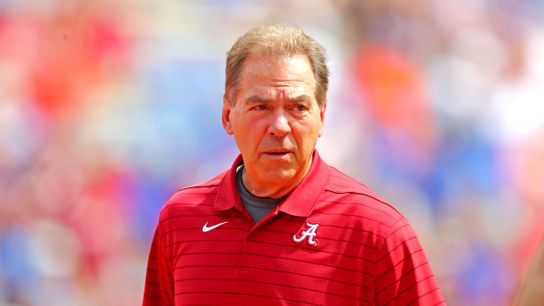I've attended the AFCA Convention for the last seven years, and at every single one I've heard a coach give a room of his peers the following advice: Chase a fit, not a job. Chase purpose, not a title. Rather than focus on getting a certain job, a certain title, a certain level, find a job that is an accurate representation of your talents.
Thing is, it's much easier to tell that to other people than yourself.
If you're a Division II coordinator and a Division I school comes calling, who has the fortitude and the self-awareness to turn that down? If you've spent the past eight years coaching wide receivers and a coach calls offering his offensive coordinator job, do you have it in you to say, "No thanks, I'm a position coach at heart."
Yeah, it's hard, even when you're Nick Saban.
Saban was elected to the 2020 class of the Louisiana Sports Hall of Fame on Tuesday, and he gave an interview to The Advertiser's Glenn Guilbeau where he admitted his 2004 departure from LSU for the Miami Dolphins was him chasing a label, not fit.
"I remember Richard Gill and Skip and I meeting in Skip's office," Saban said. "And I was really torn about it. And Skip said, 'You've just got to decide what you want your legacy to be. You want it to be as a college coach? Or do you want to try to make a name for yourself as a NFL coach?'
"And I really wanted to be a college coach, but I had it in the back of my mind all the time that the ultimate thing that you could accomplish in the profession was to be a head coach in the NFL. Don't ask me why. But that was just kind of there. And I thought, probably because of Wayne Huizenga (the late Dolphins' owner) that was the right one. He was a pretty good recruiter."
"As it turns out, what I learned from that experience in hindsight was, it was a huge mistake to leave college football," Saban said. "And I know a lot of LSU fans think I left for whatever reasons, but I left because I wanted to be a pro coach, or thought I wanted to be a pro coach. We loved LSU. We worked hard to build the program. If there was one thing professionally that I would do over again, it would've been not to leave LSU."
Saban went 48-16 with two SEC championships and a national championship in 2003 from 2000-04, and there were really no signs that the purple monster he'd built was slowing down, with Jimbo Fisher and Will Muschamp as his coordinators, Kirby Smart as his defensive backs coach, and 15 players who would later be selected over the three following NFL drafts. Saban traded all that in to coach the Miami Dolphins. He went 9-7 in his first season of 2005 and, after a trade to acquire Drew Brees from the San Diego Chargers fell through, Saban went 6-10 with the Dolphins in 2006 and was back in the college game by 2007.
The rest is well-written history from there, but Saban easily could have easily paid a higher price for his decision to trade the right job for a more prestigious one. Imagine if Rich Rodriguez hadn't given second thoughts to taking the Alabama job. Saban is probably coaching in college today, but where?
It's hard not to become intoxicated on the champagne of higher titles, higher salaries and higher levels. It's human nature, even, and even Nick Saban himself is susceptible to it.
